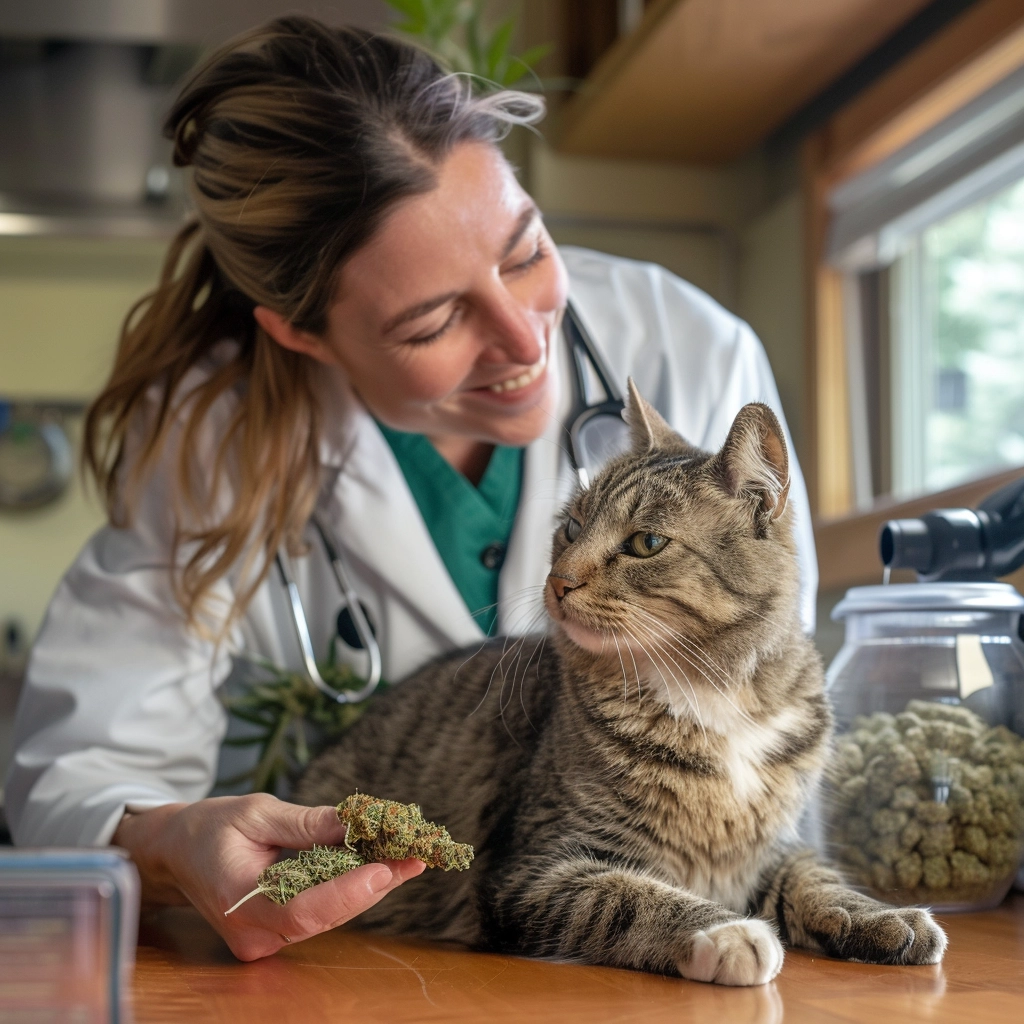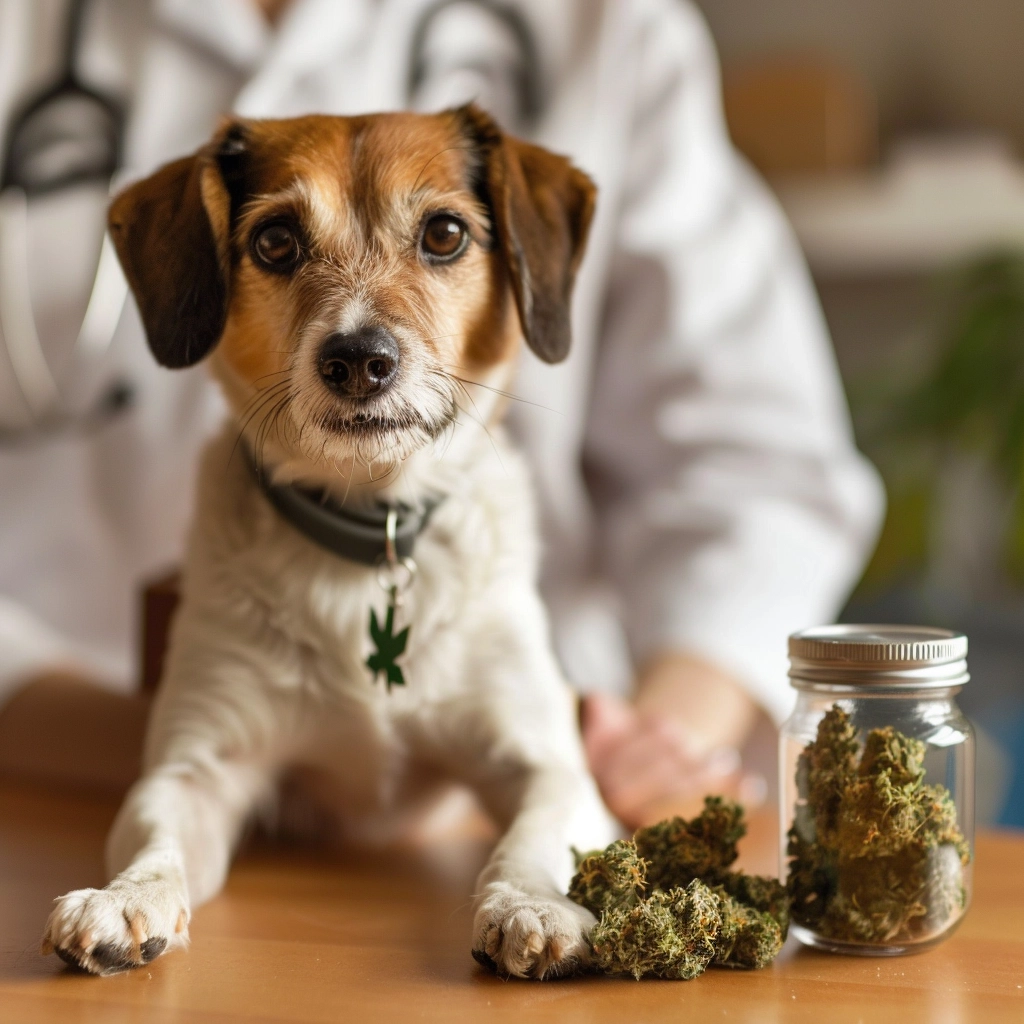In the ever-expanding universe of holistic healing, a green wave is sweeping across not just human medicine but veterinary practices too. Medical cannabis, once relegated to the fringes of alternative therapy, is now taking center stage as a promising treatment option in veterinary medicine. This remarkable journey from taboo to treatment illuminates the path toward a more compassionate, comprehensive approach to animal health and wellness. As we delve into the realm of medical cannabis in veterinary medicine, we unlock a world of potential for our furry, feathered, and scaled companions, exploring the science, benefits, and future prospects of this green revolution.


Table of Contents
ToggleA New Dawn in Veterinary Care
The integration of medical cannabis into veterinary practices marks a new era in animal healthcare. Veterinarians and pet owners alike are increasingly curious about cannabis’s potential to alleviate pain, reduce inflammation, and enhance the quality of life for pets suffering from a wide range of conditions. From chronic arthritis to anxiety, epilepsy, and beyond, the anecdotal success stories and emerging scientific evidence supporting cannabis’s therapeutic benefits are compelling.
The Science of Cannabis in Veterinary Medicine
At the heart of medical cannabis’s therapeutic potential lies its interaction with the endocannabinoid system (ECS), a complex network of receptors, enzymes, and endogenous cannabinoids present in all mammals, including humans and animals. The ECS plays a crucial role in maintaining physiological homeostasis, influencing everything from pain perception and immune response to mood and appetite. Phytocannabinoids, the active compounds found in cannabis, mimic the action of endogenous cannabinoids, modulating the ECS to produce therapeutic effects.
Cannabidiol (CBD) for Pets
Cannabidiol (CBD), a non-psychoactive cannabinoid, has emerged as the primary focus of veterinary cannabis research and use. Unlike its psychoactive counterpart, THC (tetrahydrocannabinol), CBD does not produce a “high,” making it a safer option for animals. CBD’s anti-inflammatory, analgesic, and anxiolytic properties are particularly relevant in treating conditions like osteoarthritis, chronic pain, and anxiety-related disorders in pets.


Navigating Legal Landscapes and Safety Concerns
The legal status of medical cannabis varies widely, presenting a complex landscape for veterinarians and pet owners. While hemp-derived CBD products with low THC levels are legal in many regions, the regulatory environment remains a patchwork, complicating access and use. Safety is another paramount concern, with rigorous dosing guidelines and product quality control essential to prevent adverse effects and ensure the well-being of animal patients.
Veterinary Voices: Research and Clinical Trials
The veterinary community is actively engaged in research to explore the efficacy and safety of medical cannabis for animals. Clinical trials and scientific studies are gradually painting a clearer picture, offering evidence-based insights that guide veterinary practices. However, the field is still in its infancy, with much to learn about optimal dosing, cannabinoid profiles, and long-term impacts.


The Future of Medical Cannabis in Veterinary Medicine
As we look to the future, the prospects of medical cannabis in veterinary medicine are bright. The growing interest in natural, holistic treatments, coupled with an expanding body of research, points toward an increasingly prominent role for cannabis in animal healthcare. Innovations in cannabis-based therapeutics, including targeted cannabinoid formulations and delivery methods, promise to enhance the precision and efficacy of treatments.
Bridging Gaps: Education and Advocacy
A critical step toward the widespread acceptance and integration of medical cannabis in veterinary medicine is education. Empowering veterinarians with knowledge and resources is essential to navigating the complexities of cannabis use in animals safely and effectively. Additionally, advocacy efforts are vital in shaping favorable legal frameworks that support research and clinical applications of cannabis in veterinary care.
A Vision of Compassionate Care
The journey of medical cannabis in veterinary medicine is not just about embracing a new treatment option; it’s about broadening our understanding of animal wellness and the potential of nature’s pharmacy. As we continue to explore the benefits and boundaries of medical cannabis, the vision of a more compassionate, holistic approach to veterinary care comes into focus—a vision where every pet has the opportunity to live a life free from pain and full of joy.
In embracing medical cannabis, the veterinary community steps into a new frontier of medicine, one where innovation meets compassion, offering hope and healing to our most cherished companions. The green revolution in veterinary medicine is not just changing the way we treat ailments; it’s transforming our relationship with the animals we vow to protect, opening the doors to a future where health and harmony walk paw in paw.
FAQ: Medical Cannabis in Veterinary Care
Is medical cannabis safe for all pets?
While medical cannabis, especially CBD, has been shown to be safe for many pets, safety depends on proper dosing, the specific condition being treated, and the individual animal. It’s crucial to consult with a veterinarian experienced in cannabis use before starting any treatment.
What conditions in pets can medical cannabis help treat?
Medical cannabis has been explored for various conditions in pets, including chronic pain, arthritis, anxiety, epilepsy, and inflammation. Its potential benefits range from pain relief and reduced inflammation to improved mood and quality of life.
How does CBD affect pets?
CBD interacts with the endocannabinoid system in pets, much like it does in humans. It can help modulate pain, reduce inflammation, and calm anxiety without the psychoactive effects associated with THC.
Can pets get "high" from CBD products?
Pure CBD products designed for pets are formulated to contain no or minimal THC, the psychoactive component of cannabis. Therefore, they should not make pets “high.” Always choose products specifically designed for pets to ensure their safety.
How do I choose the right CBD product for my pet?
Look for products specifically formulated for pets, made by reputable manufacturers who provide third-party lab test results to verify the product’s CBD and THC content. Consult with a veterinarian for product recommendations and dosing guidelines.
What's the legal status of using medical cannabis for pets?
The legal status of medical cannabis for pets varies by location and often follows the legal status of medical cannabis for humans. Hemp-derived CBD products with less than 0.3% THC are federally legal in many places but always check local laws and regulations.
Are there any side effects of using medical cannabis in pets?
Possible side effects can include lethargy, gastrointestinal upset, or changes in behavior. Most side effects are mild and can be managed by adjusting the dosage. Always monitor your pet’s response to treatment and consult with your veterinarian if you observe any adverse effects.
How do I administer medical cannabis to my pet?
Medical cannabis for pets can come in various forms, including oils, tinctures, capsules, and treats. The best method depends on your pet’s preferences and the specific condition being treated. Your veterinarian can provide guidance on administration techniques.
Can my regular veterinarian prescribe medical cannabis for my pet?
This depends on the legal regulations in your area and the veterinarian’s familiarity and comfort with cannabis-based treatments. Some veterinarians may be able to recommend or prescribe CBD products, while others might refer you to a specialist.
How can I ensure I'm using medical cannabis for my pet responsibly?
Start by consulting with a veterinarian knowledgeable about medical cannabis in animals. Use products specifically designed for pets, follow dosing recommendations closely, and monitor your pet’s response to treatment, adjusting as necessary.
This FAQ section aims to address common questions and concerns about the use of medical cannabis in veterinary care, highlighting the importance of veterinary guidance and careful consideration in treating pets with cannabis-based products.
Kannabu's Online Cannabis Educational Resources
Read Educational Online Guides and Articles to Learn About Cannabis
- Navigating the Green Path: CBD vs. THC in Medical Treatment
- The Aromatic Architects of Healing: The Role of Terpenes in Medical Cannabis
- Navigating the Green Frontier: Clinical Trials on Cannabis and Its Effects
- Charting the Green Path: Cannabis Dosing Guidelines for Medical Use
- The Endocannabinoid System: Nature’s Balancing Act in Human Health
- A Green Horizon: Cannabis as an Alternative to Opioids
- Navigating the Mind’s Garden: Cannabis and Mental Health Treatment
- Unlocking the Green Code: Exploring the Genetic Diversity and Pharmacological Promise of Cannabis
- Weaving Green into Gold: The Integration of Medical Cannabis into Traditional Medicine
- The Therapeutic Promise of Medical Cannabis: Exploring the Spectrum of Cannabinoids
- From Young to Old: The Compassionate Embrace of Medical Cannabis in Pediatric and Geriatric Care
- Green vs. Traditional: Navigating the Crossroads of Medical Cannabis and Conventional Therapies
- Beyond the Pain: The Comparative Effectiveness of Cannabis in Chronic Pain Management
- Unlocking Cannabis’s Secrets: The Journey Through Cannabinoid Pharmacokinetics and Pharmacodynamics
- Green Paws: Navigating the Frontier of Medical Cannabis in Veterinary Care
- Unlocking Relief: The Transformative Role of Medical Cannabis in Pain Management
- Harnessing Harmony: Medical Cannabis and the Battle Against Autoimmune Disorders
- Embracing the Night: How Medical Cannabis Transforms Sleep Management
- Turning the Tide: Cannabis as a Catalyst for Relief and Recovery in Nausea and Appetite Stimulation
- Illuminating the Neural Pathways: The Transformative Role of Medical Cannabis in Neurological Conditions
- Harnessing Harmony: Medical Cannabis and the Battle Against Autoimmune Disorders
- A Clearer View: Medical Cannabis in the Treatment of Glaucoma
- Breaking Boundaries: Cannabis and the New Frontier in Epilepsy and Seizure Control
- Revolutionizing Relief: Medical Cannabis in Cancer Symptom Management
- Navigating the Storm: Cannabis as a Beacon of Hope in Multiple Sclerosis Treatment
- Cannabis: A Natural Respite for Arthritis and Joint Pain
- Healing from Within: The Role of Medical Cannabis in Treating Gastrointestinal Disorders
- Healing Invisible Wounds: Cannabis in PTSD and Trauma Treatment
- Balancing the Mind: The Potential of Medical Cannabis in Bipolar Disorder and Mood Stabilization
- Illuminating the Mind: Cannabis in the Treatment of Alzheimer’s and Neurodegenerative Diseases

